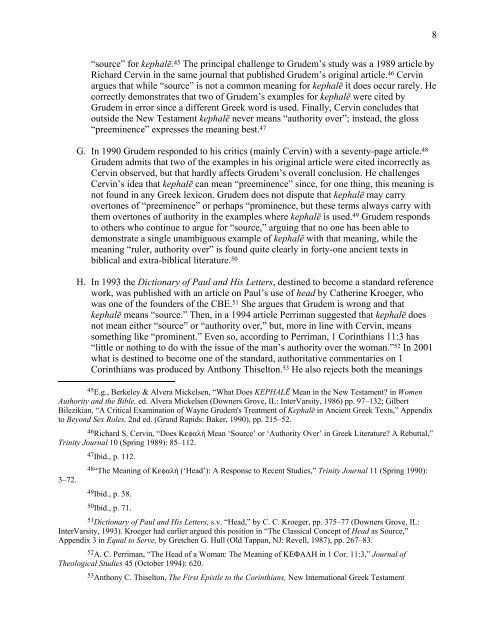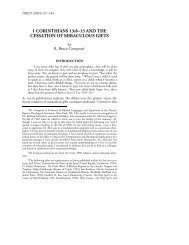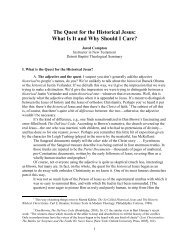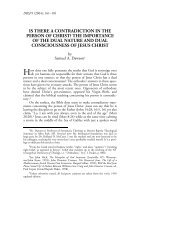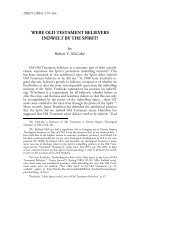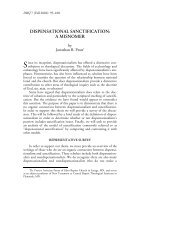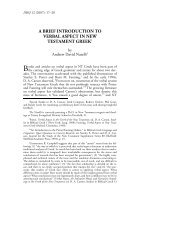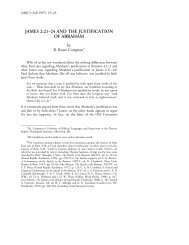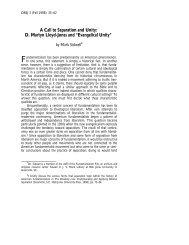Combs, Role of Women in the Church - Detroit Baptist Theological ...
Combs, Role of Women in the Church - Detroit Baptist Theological ...
Combs, Role of Women in the Church - Detroit Baptist Theological ...
You also want an ePaper? Increase the reach of your titles
YUMPU automatically turns print PDFs into web optimized ePapers that Google loves.
8“source” for kephalē. 45 The pr<strong>in</strong>cipal challenge to Grudem’s study was a 1989 article byRichard Cerv<strong>in</strong> <strong>in</strong> <strong>the</strong> same journal that published Grudem’s orig<strong>in</strong>al article. 46 Cerv<strong>in</strong>argues that while “source” is not a common mean<strong>in</strong>g for kephalē it does occur rarely. Hecorrectly demonstrates that two <strong>of</strong> Grudem’s examples for kephalē were cited byGrudem <strong>in</strong> error s<strong>in</strong>ce a different Greek word is used. F<strong>in</strong>ally, Cerv<strong>in</strong> concludes thatoutside <strong>the</strong> New Testament kephalē never means “authority over”; <strong>in</strong>stead, <strong>the</strong> gloss“preem<strong>in</strong>ence” expresses <strong>the</strong> mean<strong>in</strong>g best. 47G. In 1990 Grudem responded to his critics (ma<strong>in</strong>ly Cerv<strong>in</strong>) with a seventy-page article. 48Grudem admits that two <strong>of</strong> <strong>the</strong> examples <strong>in</strong> his orig<strong>in</strong>al article were cited <strong>in</strong>correctly asCerv<strong>in</strong> observed, but that hardly affects Grudem’s overall conclusion. He challengesCerv<strong>in</strong>’s idea that kephalē can mean “preem<strong>in</strong>ence” s<strong>in</strong>ce, for one th<strong>in</strong>g, this mean<strong>in</strong>g isnot found <strong>in</strong> any Greek lexicon. Grudem does not dispute that kephalē may carryovertones <strong>of</strong> “preem<strong>in</strong>ence” or perhaps “prom<strong>in</strong>ence, but <strong>the</strong>se terms always carry with<strong>the</strong>m overtones <strong>of</strong> authority <strong>in</strong> <strong>the</strong> examples where kephalē is used. 49 Grudem respondsto o<strong>the</strong>rs who cont<strong>in</strong>ue to argue for “source,” argu<strong>in</strong>g that no one has been able todemonstrate a s<strong>in</strong>gle unambiguous example <strong>of</strong> kephalē with that mean<strong>in</strong>g, while <strong>the</strong>mean<strong>in</strong>g “ruler, authority over” is found quite clearly <strong>in</strong> forty-one ancient texts <strong>in</strong>biblical and extra-biblical literature. 50H. In 1993 <strong>the</strong> Dictionary <strong>of</strong> Paul and His Letters, dest<strong>in</strong>ed to become a standard referencework, was published with an article on Paul’s use <strong>of</strong> head by Ca<strong>the</strong>r<strong>in</strong>e Kroeger, whowas one <strong>of</strong> <strong>the</strong> founders <strong>of</strong> <strong>the</strong> CBE. 51 She argues that Grudem is wrong and thatkephalē means “source.” Then, <strong>in</strong> a 1994 article Perriman suggested that kephalē doesnot mean ei<strong>the</strong>r “source” or “authority over,” but, more <strong>in</strong> l<strong>in</strong>e with Cerv<strong>in</strong>, meanssometh<strong>in</strong>g like “prom<strong>in</strong>ent.” Even so, accord<strong>in</strong>g to Perriman, 1 Cor<strong>in</strong>thians 11:3 has“little or noth<strong>in</strong>g to do with <strong>the</strong> issue <strong>of</strong> <strong>the</strong> man’s authority over <strong>the</strong> woman.” 52 In 2001what is dest<strong>in</strong>ed to become one <strong>of</strong> <strong>the</strong> standard, authoritative commentaries on 1Cor<strong>in</strong>thians was produced by Anthony Thiselton. 53 He also rejects both <strong>the</strong> mean<strong>in</strong>gs45 E.g., Berkeley & Alvera Mickelsen, “What Does KEPHALĒ Mean <strong>in</strong> <strong>the</strong> New Testament? <strong>in</strong> <strong>Women</strong>Authority and <strong>the</strong> Bible, ed. Alvera Mickelsen (Downers Grove, IL: InterVarsity, 1986) pp. 97–132; GilbertBilezikian, “A Critical Exam<strong>in</strong>ation <strong>of</strong> Wayne Grudem's Treatment <strong>of</strong> Kephalē <strong>in</strong> Ancient Greek Texts,” Appendixto Beyond Sex <strong>Role</strong>s, 2nd ed. (Grand Rapids: Baker, 1990), pp. 215–52.46 Richard S. Cerv<strong>in</strong>, “Does Κεφαλή Mean ‘Source’ or ‘Authority Over’ <strong>in</strong> Greek Literature? A Rebuttal,”Tr<strong>in</strong>ity Journal 10 (Spr<strong>in</strong>g 1989): 85–112.47 Ibid., p. 112.3–72.48 “The Mean<strong>in</strong>g <strong>of</strong> Κεφαλή (‘Head’): A Response to Recent Studies,” Tr<strong>in</strong>ity Journal 11 (Spr<strong>in</strong>g 1990):49 Ibid., p. 38.50 Ibid., p. 71.51 Dictionary <strong>of</strong> Paul and His Letters, s.v. “Head,” by C. C. Kroeger, pp. 375–77 (Downers Grove, IL:InterVarsity, 1993). Kroeger had earlier argued this position <strong>in</strong> “The Classical Concept <strong>of</strong> Head as Source,”Appendix 3 <strong>in</strong> Equal to Serve, by Gretchen G. Hull (Old Tappan, NJ: Revell, 1987), pp. 267–83.52 A. C. Perriman, “The Head <strong>of</strong> a Woman: The Mean<strong>in</strong>g <strong>of</strong> ΚΕΦΑΛΗ <strong>in</strong> 1 Cor. 11:3,” Journal <strong>of</strong><strong>Theological</strong> Studies 45 (October 1994): 620.53 Anthony C. Thiselton, The First Epistle to <strong>the</strong> Cor<strong>in</strong>thians, New International Greek Testament


